Following the lucrative successes of both Shaun of the Dead and Hot Fuzz, actor Simon Pegg steps away from his usual suspects (Edgar Wright and Nick Frost) for something rather different. Pegg and director David Schwimmer (yes - Ross from Friends) previously worked together on Big Nothing. Apparently the wonderful camaraderie between the duo proved so strong that they reunited for Run Fatboy Run. In essence, the film is a British romantic comedy merged with rom-com that provides solid entertainment for a rainy afternoon.
The film is bright, entertaining and fun: not a masterpiece by any means, but it's unfairly pasted and tragically overlooked. It provides sufficient gags (granted they're not memorable), charming characters, an ideal cast and a heart driving the proceedings. Sure the film is clichéd and had the potential to be better, but it supplies enough chuckles to establish Simon Pegg as a leading man and demonstrates that David Schwimmer may have found his calling as a director.
The story of Run Fatboy Run concerns overweight slob Dennis Doyle (Pegg). In the opening scene it's his wedding day, and he's scheduled to marry beautiful pregnant fiancée Libby (Newton). Dennis, however, gets cold feet and leaves Libby at the altar. Five years on we find Dennis still alone and unhappy, working as a security guard at a women's lingerie shop. He still occasionally visits his son and still has feelings for Libby who has not yet forgiven him. Dennis soon discovers that Libby has moved on and is dating a sophisticated, charming American named Whit (Azaria). Of course, Dennis begins to grow jealous. Whit is in training for an upcoming marathon that he's running for a charity. In a desperate effort to win Libby back, Dennis decides to run the marathon as well. But Dennis is an unreliable quitter who has spent his life running away from everything, thus even his closest friends are sceptical about his chances. Dennis' best friend Gordon (Moran) provides him with motivation and driving force to finish the race and prove he's a changed man.
David Schwimmer was always destined to succeed behind the camera. During his Friends days he directed several episodes of the show. With Run Fatboy Run there is obvious potential shining through in Schwimmer's directing. Even with a limited budget, he perfectly captures realistic London locations and manages to maintain a pleasant atmosphere. On top of this, never is there a contrived moment to unearth.
The script was originally set in America, but Pegg conducted a massive rewrite to alter the location to England (because a British company agreed to fund it). However, Pegg's limited involvement with the laughs is painfully obvious. American humour unfortunately dominates the screen too often. Things like nudity, vulgar language, repulsive scenarios and even some racial stereotypes. Perhaps if Pegg got together with his traditional partners in crime, this could have been far better.
As an actor, though, Pegg steals the show. He trudges through the predictable events with spirit and charm. He also manages to make his actions and lines winningly human, and handles the romantic stuff believably.
Dylan Moran is a scene stealer. He pretty much plays his regular character ala Black Books, but that's the role everyone loves him for. I can never get enough of Moran's acting when this character takes flight. The chemistry between Pegg and Moran is something special...maybe Nick Frost could get worried.
Thandie Newton is decent in her role, and then there's Hank Azaria who never appears to fit in satisfactorily.
Overall, Run Fatboy Run is a likeable and refreshing modern comedy. It's riddled with clichés and is underwhelming in the laughs department, however it's pleasant company to keep when you have a few boring hours to spare.
In my opinion, the film is underrated and quite misjudged. It's not in the same league as Shaun of the Dead or Hot Fuzz which is unfortunate, but it was never meant to. It's straightforward predictable comedy; nevertheless if you throw Dylan Moran and Simon Pegg into a scene you have an extremely fun time on your hands.
7.2/10
Plenty of fun!
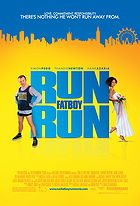 Posted : 16 years, 10 months ago on 15 August 2008 02:37
(A review of Run Fatboy Run)
Posted : 16 years, 10 months ago on 15 August 2008 02:37
(A review of Run Fatboy Run) 0 comments, Reply to this entry
0 comments, Reply to this entry
Spike Lee's masterpiece...
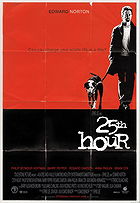 Posted : 16 years, 10 months ago on 14 August 2008 02:06
(A review of 25th Hour)
Posted : 16 years, 10 months ago on 14 August 2008 02:06
(A review of 25th Hour)
Director Spike Lee is an interesting filmmaker. Throughout his lucrative career, Lee has created several films that deeply explore and comment not solely on the respective major characters but also the settings they inhabit. 25th Hour is a multi-layered, elegiac tale of regret, missed opportunity, anger, soul-searching and self-loathing. The film is permeated with profound emotion and rich themes regarding friendship, accountability and masculinity.
Spike Lee perfectly captures the depressive atmosphere of New York City following the devastating 9/11 attacks. Much of the emotion is derived from the gloomy post-9/11 ambiance of downtown NYC, emphasised and highlighted by a key scene set in an apartment overlooking Ground Zero. The film's power is again underscored by the potency of the music: never is it overbearing...the composer keeps the music toned down but unfathomably effective. Director Lee endeavours to include many things in the film, not the least of which is portraying how New York's residents are survivors at heart. This, coupled with the various subtle metaphors and the incredible filmmaking in all aspects, is what makes this Spike Lee's greatest masterpiece.
25th Hour is a story about a drug dealer's search for redemption in his final hours of freedom. Monty Brogan (Norton) has been resigned to a nasty fate. He was found in possession of illegal drugs, and will soon be spending seven years in a maximum security prison. On bail for 24 hours, Monty endeavours to get his affairs in order. As he walks the streets, Monty begins to reflect on his life and how he got into the inescapable situation. Monty attempts to reconnect with his father (Cox) who cannot shake the reality that he is somewhat responsible for his son's fate. Monty also gets together with his girlfriend Naturelle (Dawson) and his two closest friends: Jake (Hoffman) and Frank (Pepper). Even more crucial, Monty cannot avoid the mystery swirling around in his brain of who ratted him out.
The simple plot is just the tip of the iceberg: Spike Lee and screenwriter David Benioff (who adapts his original novel) have woven together a multi-faceted, lamented story that creates engrossing viewing. Director Spike Lee adds a tangible level of anguish to the experience with his decision to not simply set the film in post-9/11 NYC, but also to give the consequences of that tragedy a prominent place in the story. The tone is intentionally depressing. Any sense of hope is deficient - none of the characters care much about the future, merely because, in their differing individual ways, they basically have no future to look towards.
The film's moral standpoint is deliberately ambiguous: while Monty is indubitably guilty of dealing drugs, in no way is he a violent or malicious man - in fact he's quite the opposite as demonstrated in the opening scene during which he rescues a dog that he finds lying in the street, tortured and close to death. Monty also sincerely cares about his girlfriend Naturelle and is never abusive; he also genuinely cares for his father and his friends. However with his contented life effectively terminated, he must decide what to do: running is an option...so is suicide...and both hold some appeal in comparison to what he expects in gaol.
Monty's furious tirade against every ethnic and minority group in the city is probably the most oblique acclamation New Yorkers have ever received. Furthermore, Edward Norton's performance is superb. This is probably the best we've seen him in since American History X: he's believable, unflinching and realistic.
However, the best performance is undeniably delivered by Barry Pepper. The actor is probably best known for his portrayal of the religious sniper in Saving Private Ryan, with a few small-known performances here and there. Pepper's every scene has you engaged and fixated. From his bloodshot eyes gawking at the stock market numbers tumbling past on his computer monitor, to the tragic scene by the river, Pepper emanates a dominant screen presence.
Phillip Seymour Hoffman brilliantly portrays the shy English teacher. Like all the other characters, he's three-dimensional and dosed in a realistic edge.
Rosario Dawson and Anna Paquin are passable as the females of the cast, with a minor appearance of the always reliable Brian Cox.
In essence, 25th Hour is a profoundly intense drama that somehow manages to grasp your undivided attention with the realistic panorama and gripping atmosphere. We're reeled in as Monty must look deep within himself, weigh up his sins and pay his dues before redemption can be earned. All of which makes 25th Hour one of Lee's more thought-provoking and judicious works. However the film isn't entirely well focused and this is a major shortcoming. It strives extraordinarily hard to be various things and serve many causes, in the end compelling the viewer to wonder what much of the content was about. Nonetheless, this causes little irreparable damage, and the film's overall effect remains untouched with its story absorbing. In the end, that's all that truly matters.
The film is still a captivating and enlightening glimpse into the personal drama of a confessed lowlife. It will inspire you to look past the pretty pictures and consider the many metaphors underneath. The 130 minutes in its running time simply flies by. Perhaps some of the sub-plots grow rather preposterous and unnecessary, but the film is deep and gratifying. The final ambiguous montage that closes the film in particular really hits home.
8.8/10
 0 comments, Reply to this entry
0 comments, Reply to this entry
Disappointing...
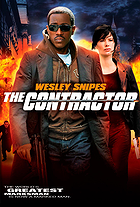 Posted : 16 years, 10 months ago on 13 August 2008 10:10
(A review of The Contractor)
Posted : 16 years, 10 months ago on 13 August 2008 10:10
(A review of The Contractor)
Following recent below average straight-to-DVD actioners such as The Marksman and 7 Seconds, Wesley Snipes continues to institute himself as the new Van Damme or Steven Seagal. It's hardly surprising that actors like Van Damme and Seagal degraded their careers by starring in straight-to-DVD films, purely because their talent is non-existent: they can't act, but they can fire a gun. Wesley Snipes had no reason to be reduced to this quality.
The Contractor is among Snipes' latest movies, and it's essentially a cousin to Mark Wahlberg's successful action movie Shooter. Both Shooter and Snipes' The Contractor focus on former specialist operatives called back into service before ultimately being betrayed and set up. But while Wahlberg's character is aided by a beautiful babe, Snipes gets his assistance from a precocious teenager. The screenwriter is essentially taking a page out of Luc Besson's Léon (also known as The Professional). So there we have it...The Contractor mixes equal parts of Léon and Shooter. However, it isn't as charming and absorbing as the former, or as thrilling and intense as the latter.
Former professional contractor James Dial (Snipes) now lives a secluded life at his Montana ranch. He frequently evokes the memory of failing an assignment several years earlier when he was unsuccessful in eliminating a renowned terrorist. Dial is approached by his former employer who allows him the opportunity for another shot at assassinating the terrorist who is now under heavy protection in London. It will impart personal satisfaction as well as further financial advantages. Dial executes his task, but is then forced into hiding as the British police relentlessly pursue him. He's hurt and hunted, and it isn't long before he crosses paths and dubiously befriends young Emily (Bennett) who doesn't seem the slightest bit reluctant to help a highly wanted man evade justice. Alrighty then...
Wesley Snipes demonstrates that, even with weak career moments under his belt, he can still carry a picture. For an action movie, Snipes brings staggering depth and intrigue to his character. Young Eliza Bennett is doubtlessly the film's biggest surprise. She competently masters her character and flaunts convincing acting skills. She has her unfortunate weak moments though, such as the unrealistically corny relationship with her grandmother.
German director Josef Rusnak keeps the action moving and the pacing fairly brisk. With a terrific cast (for the most part) the film also exhibits plenty of decent drama. However the film is unforgivably marred by the cinematography techniques and the script. The shootouts, especially those towards the climax, simply cannot engage a viewer. All the action fails due to the almost Michael Bay-eque style of filming: fast cuts, shaky handheld shots that aren't properly focused, migraine-inducing strobe lights, and additionally some amateurish film speed manipulations (slow motion, things sped up...and even freeze frames). Some villains can't even hold their firearms correctly which is a sure sign that research was never a priority. The action is entertaining, but could be far more exhilarating.
The movie also fails as a thriller because the twists don't raise the stakes. Additionally, Snipes' James Dial ostensibly prefers to avoid confrontations and gun-fights. Instead, he continually absconds. This could have worked, however with pay-offs so trifling and promising set-ups so common it feels unsatisfying. The screenwriter cannot avoid those dumb action movie clichés either. A gun battle on a construction site occurs, but do the workers or civilians nearby (which we clearly see following the battle's conclusion) care or call the cops? Nope, they don't even notice anything despite plenty of gunfire. And are we supposed to believe an investigation can terminate so suddenly? No paperwork? Come on!
Overall, The Contractor isn't as terrible as I expected. It's also among the best straight-to-DVD films Snipes has featured in, although that is a faint praise. A promising story that clearly takes inspiration from Shooter and Luc Besson's Léon is marred by a below average script and an abundance of stupidity to boot.
5.3/10
 0 comments, Reply to this entry
0 comments, Reply to this entry
Awful...
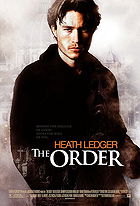 Posted : 16 years, 10 months ago on 13 August 2008 07:47
(A review of The Order)
Posted : 16 years, 10 months ago on 13 August 2008 07:47
(A review of The Order)
2003's The Order (known in the Australia as The Sin Eater) is an appalling attempt at a religious-themed horror movie. The days of The Exorcist and The Omen have come and vanished. While some consider them horror masterpieces, they have dated and are now unspeakably silly affairs. Considering the batch of religious horror movies that crept out and died in the past decade (like Arnie in End of Days and the mediocre Roman Polanski/Johnny Depp film The Ninth Gate) it's amazing that someone took another stab at the genre. This time it's writer/director Brian Helgeland who tries his luck. Considering his previous work on Mystic River, Blood Work and L.A. Confidential one would assume that he could produce a quality product. But Helgeland was also behind A Knight's Tale, and his dreadful screenwriting skills come out to play with this film as well. It seems the writer/director also brought along the cast for A Knight's Tale and plonked them into random roles...whether they suit their assigned role or not. On that note, virtually every performance is terrible.
The Order was subsequently greeted with a terrible critical reception upon release, and to me it seems for good reason. The Catholic Church was apparently extremely displeased with the outcome of this production. Perhaps the Catholics should have sued the filmmakers for defamation of religion. Even better, poor cinema-goers that endured this mess should have sued the studio for defamation of personal time or something.
Father Alex Bernier (Ledger) is a rogue priest. He receives word that the leader of his order has died in Rome under mysterious circumstances. Alex is encouraged to travel to Rome and investigate the death. Naturally, this handsome young priest is accompanied by an attractive young woman. In this case we have former mental patient Mara (Sossamon) who was institutionalised for trying to kill Alex. Now Mara is being sought after by the police...yet she has no problem obtaining a passport and flying to Rome, and of course Alex completely trusts Mara despite her trying to kill him. (Sorry if this explication isn't making any sense...the movie never makes an effort to account for this bullshit either)
Anyway, the clichéd story begins to unfold once the proceedings commence in Rome. Alex learns of a "Sin Eater" in the form of a man named William Eden (Furmann). Basically, a Sin Eater visits the bedsides of dying folk and absorbs their transgressions. Sin Eaters essentially provide a path to heaven outside religion. In return for his services, a Sin Eater becomes fabulously wealthy and is immortal. (This is never adequately addressed either...I mean how can one all of a sudden become wealthy and immortal? Would dead people just pay him?) After a Sin Eater carries out his duties for a few centuries, he needs to pass on the torch. Eden wants to give the task to Alex.
For lack of better word, The Order is pure horror tosh: it's excruciating, confusing, convoluted...and after a while it's just plain boring. There is an interesting premise for sure, but the script spoils the potential. Its cardinal sin as a horror movie is never actually scaring the audience, nor intriguing them. It's tagged as a thriller, but nothing is ever thrilling. It provides little exposition as everything seems to be a melodramatic murder mystery, trudging from one senseless half-baked scene to the next. It simply does not work. Even worse is that the film is never entertaining. By the time some "sin eating" actually occurs, we're already bored stiff and cannot feel exhilarated no matter how impressive it looks. The dialogue in particular is boring and contrived. You don't know whether to laugh or shake your head in incredulity.
The Order is dark, gloomy, absurd, and predictable. People speak in ambiguous riddles, the humour fails, and the sins themselves rise from people's bodies resembling jellyfish. Then finally the ending (which seems to go on forever) takes a completely conventional turn that's more silly than creepy or exciting. Worst of all there's Heath Ledger (R.I.P) mumbling through his tedious lines. He looks incredibly bored to be there, and I don't blame him. Since his career was already far too short, why did he waste his time on this rubbish? He could have developed a far more successful career before his unfortunate death if only he made the correct decisions. Life's too short to be involved in crappy movies. Shannyn Sossamon also falls flat, as does Mark Addy who never develops any charm or reason to like him at all. Peter Weller of the RoboCop fame should stick with the robotic police officer...he's derisorily awful in his role. There are no redeeming performances at all. The Order fails on practically all accounts...it only gets credit for trying.
3.8/10
 0 comments, Reply to this entry
0 comments, Reply to this entry
Intense political actioner
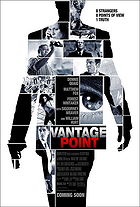 Posted : 16 years, 10 months ago on 13 August 2008 05:06
(A review of Vantage Point)
Posted : 16 years, 10 months ago on 13 August 2008 05:06
(A review of Vantage Point)
At its core, Vantage Point is a hybrid creation: an amalgamation of Akira Kurosawa's Rashomon and the hit television series 24. In fact the film could effortlessly be perceived as a sibling of 24 as it contains intense political drama, terrorism, the President of the United States in peril, and a fairly convoluted conspiracy to uncover. Mind you, what's missing is Jack Bauer (although, to be fair, it does star Matthew Fox who plays a Jack on TV's Lost).
Vantage Point is an imaginative, frantic, nail-biting, gripping political actioner that spends its 90-minute duration illuminating one series of events from different perspectives. Personally, I found the film extremely flawed but underrated. I was dubious to approach the film due to the largely mixed reviews. However, this is an above average attempt at a killer concept. While the film feels incomplete and occasionally thoroughly preposterous, it achieves its goal of providing entertainment. The opening few scenes will successfully reel in a viewer due to the intriguing and compelling nature of the story unfolding. The filmmakers cleverly adopt an effective approach to lensing the action that resembles such modern action films as The Bourne Ultimatum. While this exercising of quick cuts and shaky cam has grown tiring over the years, here it's actually fruitful in its engagement of the audience.
The fundamental story concerns an attempted assassination on the President of the United States, Henry Ashton (Hurt). This basic premise is enlightened with a series of differing perspectives, mirroring recent films like Crash with a slight drop of Akira Kurosawa's Rashomon moulded into the story.
At a landmark summit on the global war on terror in Spain, President Ashton is gunned down. The film then concerns the chaotic ensuing events as the manhunt commences for the shooter. The film primarily involves the proceedings that initiate at midday and conclude 23 minutes later. Bits are replayed from various perspectives: this includes viewpoints of Secret Service agents (Fox, Quaid), President Ashton, an American tourist (Whitaker), journalists and even the terrorists themselves.
Vantage Point is approached with a high level of technical aptitude. Running at a brisk running time of about 90 minutes, the director keeps events taut and engaging. Most commendably, the director is skilled at keeping constant visual continuity. We witness events from multiple angles...sometimes up to even 10 viewpoints courtesy of the media, surrounding buildings, and the various civilians on the ground mixed in the chaos. The intensity and turmoil following bomb detonations and bullets fired is enough to echo the collapse of the World Trade Center on that fateful day in 2001. The final 20 minutes shift the film's tone from drama to action. There's a terrifically filmed car chase blended with various other action-packed happenings.
However, the film's primary faults are in its script. At times the dialogue sounds natural, but at other times contrived. At several times you'll be tempted to laugh at the dialogue. For example, Quaid's Agent Barnes finds the President heavily bleeding. Barnes inquires "Are you injured?" The multiple story-line approach does work to an extent, but only selected characters are delved into in any degree of depth. We're supposed to care about the various characters as we watch their stories; however it's impossible with insignificant time allocated for character development. As typical betrayals happen, we never understand why. Then there are the loose ends. We become so involved in all the excess supporting characters without a pay-off. Some characters appear to be established in the opening scenes...only to disappear entirely. Because these characters are slightly developed, we become curious about them. There are too many questions without answers.
I also briefly mentioned the stupidity of the film. Towards the final confrontation, things become extremely silly as characters are quick to draw guns on each other, and the stunt driving for the final car chase is too unbelievable. Another thing is the failure to give the story any level of credibility. We never believe the story for a single minute simply because the concept could never happen. And then of course the clichés are also in place, like the never-ending clips in firearms and a customary character betrayal. Yes, the film is entertaining...it's just too silly to live up to its full potential.
Dennis Quaid is no Kiefer Sutherland. Where Sutherland in TV's 24 has a deep voice and instils incredible intensity to a situation, Quaid usually falls flat. Matthew Fox found fame in the television series Lost. I never liked his acting in that show, and I still don't like his acting here. He simply takes himself too seriously and his eagerness always shines through in all of his acting. Forest Whitaker is an Oscar-winning actor who never appears to do much in the film. He has a video camera, yes, but the rest of the film he's endlessly pursuing people and trying to help. The screenwriter never grants him a moment to shine. Whitaker's relationship with a young girl also feels out of place and superfluous. Also in the supporting cast there's William Hurt, Edgar Ramirez and a cameo appearance of Sigourney Weaver. Many of these actors are underused.
Overall, Vantage Point has its flaws but it's an extremely entertaining movie. The competency behind the camera is palpable with solid direction and an ear-shattering sound mix. The action is frequent and exciting, even if there isn't much point to it. Maybe with more depth and a heightened intelligence level the film could have achieved its potential.
Vantage Point, which was initially dosed in realism, enigmatically shifts its mood in the concluding 15 minutes; staggering into clichéd action-thriller territory with a car chase that, while exhilarating, does not seem appropriate. Likewise, you'll undeniably snigger as Quaid belies the realism, becomes indestructible and, once the action has receded, conveys some of the cheesiest lines this on side of Top Gun. Sadly the film loses its grip and abandons the brutal tone. This film merely reminds us how fantastic the Jason Bourne franchise is for its virtually unequalled ability to have never crossed the line.
7.1/10
 0 comments, Reply to this entry
0 comments, Reply to this entry
Impressive vigilante actioner!
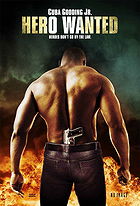 Posted : 16 years, 10 months ago on 12 August 2008 10:21
(A review of Hero Wanted)
Posted : 16 years, 10 months ago on 12 August 2008 10:21
(A review of Hero Wanted)
Vigilante action thrillers are common occurrences in contemporary Hollywood. Films such as The Punisher have utilised the concept of revenge for an interesting actioner. Jodie Foster in The Brave One toyed with the concept of an innocent civilian fulfilling the duties of a stereotypical vigilante hero. Hero Wanted is a creditably gritty, exciting revenge flick unlike any of its genre forerunners. This is a tragically overlooked and underrated film featuring several great actors and a realistic portrayal of man's darker side. It's rare indeed for a movie to probe that area of human nature with this level of established veracity and pragmatism in the tone. The filmmakers deeply delve into man's desire for their 15 minutes of fame, and the consequences of "being a hero". However, in spite of exploring these deep themes so effectively...the clichés sporadically break through. On the whole, things feel quite formulaic and occasionally predictable. But there is enough taut action and proficient filmmaking on exhibition to bestow a wholly entertaining experience.
Liam Case (Gooding Jr.) is a despondent garbage man who lost his wife several years ago in a tragic car accident. Now he's an alcoholic sincerely depressed with his insignificant existence. However his life finds further meaning when he witnesses a flaming car wreck unfold. Liam instinctively dives into the situation and rescues a little girl who was trapped in the flames. He subsequently becomes a hero and the city loves him. Following his short period in the spotlight, people move on and forget his heroic act. He therefore returns to his former depressive existence. His heroic instincts are kicked back into action again, however, when he's inside a bank during an armed robbery. The attendant, who he has a crush on, is shot by the robbers and she falls into a coma. Liam decides to search for the gang of robbers and dispense justice on them.
Hero Wanted bypassed a worldwide cinematical release...instead in most countries it went straight to DVD. In my opinion the film is a sleeper hit. The technical aspect of the film in particular never feels amateurish. The early action sequences are highly impressive: short, tight, explosive and exciting. Even better, the typical shaky cam and quick cutting isn't heavily utilised. The concluding action scene exercises clever dolly shots and wide angles to tell the story. For the most part, the editing is above average. On top of this, pulse-pounding music and a booming sound mix to keep an audience engaged. The action is also grounded in realism and credibility: guns are reloaded, people bleed, and no-one is invincible. The strong graphic violence packs an overwhelming wallop.
With such a competent team behind the camera, the colossal script failings are unfortunate. The script is repeatedly dragged back to traditional action movie hackneyed themes and theatrical devices. The final 30 minutes grow increasingly preposterous as well. Moreover, the out of place ending proves quite disappointing. It seems too happy and predictable. Characters are treated with too much sentimentality and it's clear the filmmakers were pushing for a "feel good" kind of ending with a smidgen of darkness to its tone. The plot frequently meanders as well with supporting characters introduced for the sake of a violent death. The film's twist proves quite shocking and effective...however it just isn't executed with any style. Much of the dialogue that occasionally sounds intelligent is marred by the contrived profanity.
Cuba Gooding Jr. is a convincing protagonist. He successfully nails the different facets of his character: from a raging alcoholic to a worried man trying to keep everything under control.
Ray Liotta seems quite underused, but he appears determined. The rest of the cast are all equally impressive. Thomas Flanagan's villain is particularly effective and sinister when it's called for.
Overall, Hero Wanted may not be the best vigilante movie ever made or a masterpiece either. Nevertheless, this flick really surprised me. It features a stellar cast, top notch production values and technical proficiency especially during the intense action sequences. It will keep you entertained.
6.9/10
 0 comments, Reply to this entry
0 comments, Reply to this entry
Quality Korean cinema!
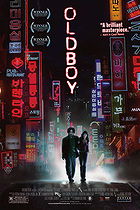 Posted : 16 years, 10 months ago on 12 August 2008 03:42
(A review of Oldboy)
Posted : 16 years, 10 months ago on 12 August 2008 03:42
(A review of Oldboy)
Chan-wook Park's Oldboy is an intense, gut-wrenching Korean thriller. The film has received continuous accolades since its initial release in 2003 and its more global release in 2005.
Oldboy is perhaps best remembered due to its heavy content: the violence, torture and themes are unflinching and far more uncompromisingly pungent than any American thriller. Instead of the customary over-the-top martial arts, the filmmakers opt for far more brutality. Witness a five-minute shot depicting the central character confronting a gang of thugs in a corridor. This is a nasty, vicious conflict without any fancy Jackie Chan-style choreography: this is dirty street fighting as men assault each other, sometimes falling, sometimes missing. Objects are utilised as men are stabbed or beaten. People bleed and show vulnerability as well as weakness. The punches sound like actual punches...men get tired, men lose energy and collapse after growing out of breath. It's this impressive edge that elevates Oldboy higher than most Asian productions.
Personally, I've never had a fondness for Asian cinema. Films such as Hero come across as convoluted and confusing but with beauty in the visuals. These visuals, however, generally seem over-the-top and suspending disbelief is too difficult. Oldboy is far more down to earth and believable. The visuals are impeccably constructed: each shot engages an audience with its panache and elegance. The grimy streets, filthy characters and engrossing scenarios are more effective. Below its face value the film is a deep, thematic character study regarding a heart-stopping journey of one man's quest for vengeance.
Oldboy opens with a bang. As engaging music absorbs the viewer, the visuals depict a wild-haired man dangling another man off the edge of a building by his tie. This wild-haired man is Oh Dae-su (Min-sik). In a flashback his story is revealed: Dae-su is a regular man with a loving family. Under perplexing circumstances, he is kidnapped and incarcerated in a secure hotel room for a total of 15 years. Over the course of these 15 years, he has had nothing but dumplings to eat and his only window to the outside is a TV. He learns that his wife has died, and he has been framed for the murder. From this point forward he vows to escape and acquire his revenge. His captors eventually free Dae-su. He is given a wad of cash and a cell-phone. The mastermind behind his capture challenges Dae-su to find him within 5 days...if Dae-su does this, he will learn the reason why.
This is the mystery that drives Oldboy so effectively: it isn't long before the villain is revealed, but the ambiguity clouding the "why" is what fuels the proceedings. This builds to the film's shocking climax. This final confrontation presents an audience with a succession of astonishing twists.
The production values are first-rate considering the genre and origin. The torture scenes feel so realistic that one will be squirming in their seat. And the action scenes...are phenomenal! On top of this the director's style is enough to keep one engaged for the dialogue and the action. The cast competently tackle their characters as this established realism is further retained. The highlight of the film is undeniably its music. The main theme is haunting and evocative. This theme is repetitive and is used constantly. The music simply cannot be faulted. The tone is continually established with each new segment of music.
However, there is one lethal flaw: the film is very difficult to follow and keep up simply due to the appalling distinguishing of key plot points. From the film's beginning I struggled to find a coherent succession of scenes. Only with repeated viewings can one entirely understand the movie. This flaw is present in virtually every piece of Asian cinema I've seen so far. Oldboy is just superior because with its stylish visuals and brutal tone, we're compelled to be swept along with the proceedings.
Overall, Oldboy is a stunning Korean film that has earned an enormous fan base since its initial release. The film is a visceral cinematic experience created by a masterful group of filmmakers who excel at their art. It's hard to follow at times, but still mighty entertaining and extremely violent!
7.85/10
 0 comments, Reply to this entry
0 comments, Reply to this entry
A complex animation for adults
 Posted : 16 years, 10 months ago on 12 August 2008 03:29
(A review of Grave of the Fireflies)
Posted : 16 years, 10 months ago on 12 August 2008 03:29
(A review of Grave of the Fireflies) 0 comments, Reply to this entry
0 comments, Reply to this entry
An underrated horror gem
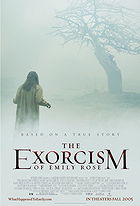 Posted : 16 years, 10 months ago on 11 August 2008 08:46
(A review of The Exorcism of Emily Rose)
Posted : 16 years, 10 months ago on 11 August 2008 08:46
(A review of The Exorcism of Emily Rose)
The Exorcism of Emily Rose is a distinctively unique horror movie. The film's storyline is loosely based on the true story of a German woman named Anneliese Michel: in 1976, young Michel died following a series of unsuccessful exorcisms when it was believed that she was possessed by demonic forces. The film is essentially an "Americanised" version of these events that unfolded in the 1970s. Anneliese Michel has been replaced with the character of Emily Rose (Carpenter), and the events have been transplanted into a rural American setting.
To most audiences, the title probably implies a link to the 1970s horror classic The Exorcist. However, The Exorcism of Emily Rose does not follow the path of a mainstream horror movie. Instead of scenes showcasing gore-fests and geysers of blood that lacks suspense, the filmmakers have alternatively produced a drama/horror hybrid. The film mixes courtroom drama with a supernatural thriller. The audience is offered intelligent and insightful discussion that present scientific evidence in relation to religious phenomena.
The Rose family lives in an isolated farmhouse in pastoral America. The opening scene establishes the situation: 19-year-old teenage girl Emily Rose has died and her family are in mourning. Those investigating the death of Emily ultimately arrest the Rose family's priest, Father Moore (Wilkinson), for negligent homicide as a result of performing an unsuccessful exorcism. Father Moore begins denying any deals that fly in his direction, stating that he wishes to reveal the true story of Emily Rose. Agnostic lawyer Erin Bruner (Linney) is hired to defend Father Moore. As the trial against Father Moore commences, the story of Emily Rose is conveyed through flashback. While doctors insist Emily's condition appears like a severe case of psychosis or epilepsy, other views are uncovered as further testimonies are presented. The evidence revealed could prove that Emily was in fact possessed by several satanic demons.
The greatest aspect of The Exorcism of Emily Rose is that it never seems to jam a single perspective down the throat of the audience. Instead the film offers compelling arguments for numerous possibilities. Was Emily actually possessed or is it a bunch of religious superstition? This question is never explicitly addressed...allowing an audience to form their own interpretations.
The Exorcism of Emily Rose is a competently crafted supernatural horror film. The film doesn't conform to the typical formula for a horror movie. The formula is instead disregarded: this is courtroom drama melded with intense, suspenseful horror sequences. The occasionally cheesy melodramatic courtroom drama is balanced with several scenes that will send chills down your spine. The scene depicting the exorcism is particularly haunting and terrifying. When one considers that this is based on a true story, things become far scarier. Whether you believe in religion or not, it's virtually impossible not to find this film scary. It's simply one of the most effective chillers in recent memory. At times it scared the living daylights out of me. Director Scott Derrickson proves competent at the helm. The use of his sets and locations make things far more atmospheric and effectual. The music further reinforces the chilling tone.
Laura Linney handles her role capably. Cue the smart outfit and the typical lawyer persona, and it's almost like Linney was aiming for an Oscar nomination. The script provides her with a suitable character. Tom Wilkinson is remarkable as Father Moore. He gives his religious rambling far more credibility with his facial expressions and passion sizzling in his eyes. Personally I've never taken a liking for the actor, but now my respect has elevated enormously. Young Jennifer Carpenter steals the show as the young Emily Rose. She's convincing, deep and unforgettable.
Overall, The Exorcism of Emily Rose is criminally underrated. While genre aficionados may not find the drama to their liking, I found the film to be original, engrossing and entertaining. With plenty of suspense and a solid script, this movie is recommended viewing.
8.3/10
 0 comments, Reply to this entry
0 comments, Reply to this entry
Masterful...
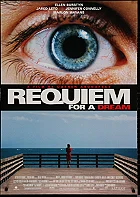 Posted : 16 years, 10 months ago on 11 August 2008 06:54
(A review of Requiem for a Dream)
Posted : 16 years, 10 months ago on 11 August 2008 06:54
(A review of Requiem for a Dream)
Darren Aronofsky's Requiem for a Dream is intense, uncompromising, disturbing and depressing. It is a rare film that is emotionally fatiguing due to the unremittingly powerful portrayal of its subject matter. Writer/director Aronofsky deserves to be lauded for his representation of drugs and the consequences of addiction on everyday people. Aronofsky cuts no corners, nor does he dilute the material. Requiem for a Dream offers its audience no optimism, no respite and no escape. In fact the director is admirably not afraid to give its audience no pay-off at all.
The film is an adaptation of the mid-1970s novel penned by author Hubert Selby. Aronofsky tailored the novel to suit an updated agenda: this is a more contemporary re-imagining of Selby's dim and despondent world of drugs and addiction. Not much of Selby's novel remains; nevertheless there is the sense of malaise and the illustration of the highs and lows experienced by the characters as well as the dreadful deterioration into darkness that permeated Selby's original work. Aronofsky exercises masses of cinematic techniques to portray this decline into oblivion. He additionally utilises a sense of isolation to distance his characters in order that their cravings, which leisurely plague their inner core, discover no sanctuary in the sincerity of relationships. The subsequent collapse of reality consequently leaves them devastated and ravaged...they become shattered and measly shadows of their former selves. By no means is this a beautiful picture: Aronofsky cuts no corners nor does he endeavour to leave the viewer with any skerrick of compassion for these characters, yet you are compelled to feel penitence for their situation which is testament to both the actors and the intricate script.
Requiem for a Dream is primarily a tale that delivers a powerful message about the consequences of drug addiction. The four central protagonists are vehicles for conveying a message regarding different varieties of drugs and how they can have equally tragic effects on individuals. There are three segments to the movie that occur in different seasons as the story progresses: the first third is Summer, then Fall, then Winter.
Harry Goldfarb (Leto) and his buddy Tyrone (Wayans) become dangerously addicted to drugs. In order to feed their growing addictions, and to satisfy their waning wallets, they purchase drugs and redistribute them. Harry's girlfriend Marion (Connelly) shares a perilous addiction to drugs, and her descent into personal deterioration is far more profound. As her story progresses, she eventually sells herself into prostitution to pay for drugs.
Harry's mother Sara (Burstyn, in an Oscar-nominated performance) has a life revolving around food and television programs. When Sara receives a phone call inviting her on TV, she feels the need to lose weight. Eventually she becomes obsessed with losing weight, and ultimately purchases diet pills. An ostensibly harmless diet develops into a life-threatening addiction.
The disturbing stories are enormously difficult to watch, to say the least. Never does Aronofsky offer a glimmer of hope for the tragic characters. Requiem for a Dream was continually hailed as a masterpiece by many critics and audiences alike, but this masterfully-crafted tale isn't without flaws. Everything is incredibly depressing and commendably uncompromising for sure, however it's dourly predictable. Halfway through the film we realise that the consequences will be dire on the characters. It becomes systematic from that point forward. There are no unforeseeable twists or turns unfortunately: it's just an endless montage of misery that steadily expands the predictability.
Ellen Burstyn received numerous accolades for her performance as the troubled Sara Goldfarb. The role would have been extremely challenging due to the emotional depth and the profound transformation the character undergoes. At first so bright, colourful and exuberant...eventually she becomes drab and lifeless.
Jared Leto is equally impressive. His performance is wholly credible and engaging. He feels like any young male whose life is irrevocably and tragically altered by his craving for drugs.
Jennifer Connelly is another outstanding addition. Remember young Jennifer from films such as Labyrinth when she was a teenager? This is Jennifer like we've never seen her before. As her character is forced into sex shows and prostitution, her performance is unflinching.
Marlon Wayans is brilliant in a serious role. He could have made a career in dramas as opposed to comedy.
Overall, Requiem for a Dream is not a film for the faint of heart. The director wants an audience to feel overwhelmed by his graphic images of drug usage and explicit sexual activities. Originally the MPAA gave the film an NC-17 rating due to the content. The film was also released in a more dilute version to suit commercial purposes. This more watered down version was disowned by Darren Aronofsky who felt it made a lighter impact.
8.0/10
 0 comments, Reply to this entry
0 comments, Reply to this entry
 Login
Login
 Home
Home 183 Lists
183 Lists 1671 Reviews
1671 Reviews Collections
Collections
